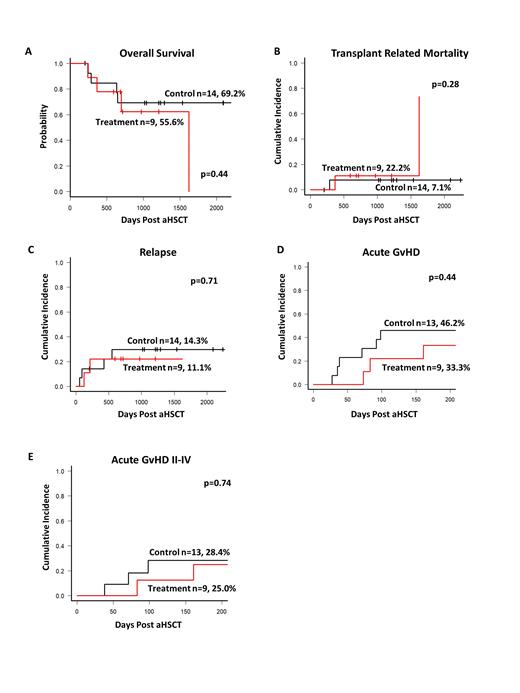Allogeneic stem cell transplantation (aSCT) is used to cure hematologic malignancies or deficiencies of the hematopoietic system. It is associated with severe immunodeficiency of the host early after transplant and therefore early reactivation of latent herpesviruses such as CMV and EBV within the first 100 days are frequent. Small studies and case series indicated that application of herpes virus specific T cells can control and prevent disease in this patient population.
Study Design: A randomized, controlled, phase I/IIa multi-center study was conducted in 5 centers in Germany between 2013 and 2018 (ClinicalTrials.gov Identifier: NCT02227641). The study aimed at prevention or pre-emptive treatment of reactivation of CMV and EBV post aSCT. Major inclusion criteria were male or female HLA matched (10/10) unrelated or related donor seropositive for CMV and EBV, patient age between 18 and 75, the use of PBSC as stem cell source and the presence of on of the following HLA alleles: A*01:01, A*02:01, B07:02, B*08:01, B*35:01, C*07:02. CMV/EBV specific T cells were generated from a fraction of the allogeneic stem cell graft by stimulation with peptide pools for both viruses developed at the University Hospital Erlangen. Three doses of 5x10E4 CD3+ T cells per kilogram body weight were applied with an interval of at least 30 days without dose escalation starting earliest at day 30 after aSCT. Observation period was 204 days after aSCT. Primary endpoint of the study was toxicity of the T-cell-product assessed as acute transfusion reaction and acute GvHD due to the infusion of activated T cells.
Results: 33 patients were screened and 29 patients were randomized. 16 patients were randomized into the treatment group of who 3 patients crossed over to the control arm due to failure of manufacturing the product or due to not meeting release criteria. Four patients were excluded from the study before receiving the first dose due to transplant related toxicity or withdrawal of consent. In total 9 patients were treated with 25 doses of the T cell product (dose range 2.1-4.1x10E4/kg CD3+ T cells). The earliest infusion was on day 30 (range: 30-69) post aSCT. There was no statistical difference between the groups regarding disease, patient age, donor type, performance status and comorbidities. The median follow up for both groups was 930 days. None of the patients treated experienced any acute transfusion reaction. Two patients developed acute GvHD after the second infusion and did not receive the third dose. Overall there was no statistical significant difference regarding survival (A) (treatment: 55.9% vs. control 69.2%, p=0.44), transplant related mortality (B) (22.2% vs. 7.1%, p=0.28), relapse (C) (11.1% vs. 14.3%) and acute GvHD (D,E) (33.3% vs. 46.2%, p=0.44). Number of AE per patient (27.1±24.6 vs. 24.4±11.2, p=0.60) and severity of AE (1.60±0.39 vs. 1.64±0.24) were similar in both groups. The incidence of reactivation of CMV (44.4% vs. 64.3%, p=0.16) and EBV (77.8% vs. 44.4%, p=0.12) was not statistically different and not associated with the treatment as several reactivations of occurred before application of the first dose. Within the treatment group we observed in several cases substantial expansion of CMV and EBV specific T cells in the peripheral blood which could not attributed to the presence viral antigens in case of reactivation.
Conclusion: The study met its primary endpoint as there was no toxicity of the T-cell product observed. The cumulative incidence of acute GvHD as the primary endpoint was not statistically different in both groups and there was no acute toxicity related to the product. The study suffered from slow recruitment due to the market approval of Letermovir and low patient numbers did not allow for conclusive analysis of secondary endpoints such as the use of antiviral therapy.
Disclosures
Aigner:Miltenyi Biomedicine, Miltenyi: Honoraria; Miltenyi Biomedicine, Kyverna: Research Funding. Zeiser:Medac: Honoraria; Sanofi: Consultancy, Honoraria; MNK: Consultancy, Honoraria; incyte: Consultancy, Honoraria; novartis: Consultancy, Honoraria, Research Funding; VectivBio: Consultancy. Mackensen:Kyverna: Research Funding; Miltenyi Biomedicine, Ixaka, Novartis, BMS/Celgene, Gilead/KITE: Honoraria.


This feature is available to Subscribers Only
Sign In or Create an Account Close Modal